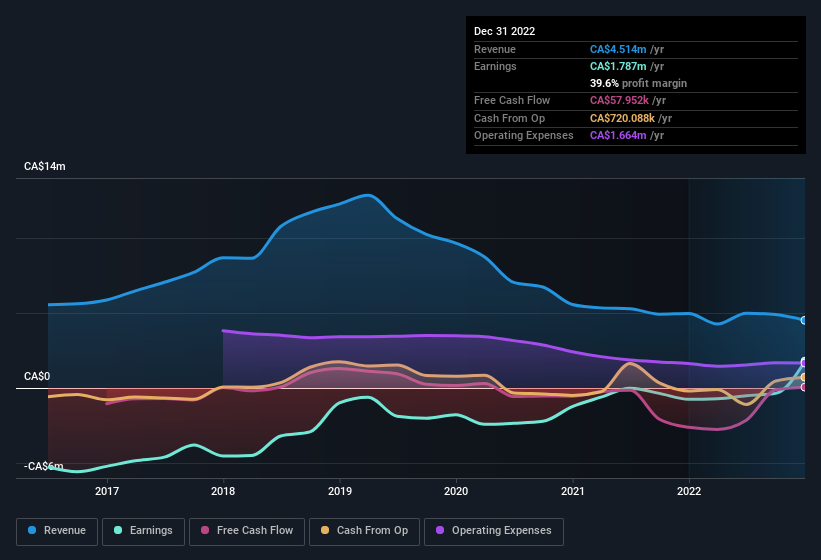- Canada
- /
- Oil and Gas
- /
- TSXV:NZ
New Zealand Energy's (CVE:NZ) Robust Profit May Be Overstating Its True Earnings Potential

New Zealand Energy Corp.'s (CVE:NZ) stock performed strongly after the recent earnings report. Investors should be cautious however, as there some causes of concern deeper in the numbers.
View our latest analysis for New Zealand Energy

A Closer Look At New Zealand Energy's Earnings
Many investors haven't heard of the accrual ratio from cashflow, but it is actually a useful measure of how well a company's profit is backed up by free cash flow (FCF) during a given period. The accrual ratio subtracts the FCF from the profit for a given period, and divides the result by the average operating assets of the company over that time. You could think of the accrual ratio from cashflow as the 'non-FCF profit ratio'.
As a result, a negative accrual ratio is a positive for the company, and a positive accrual ratio is a negative. While it's not a problem to have a positive accrual ratio, indicating a certain level of non-cash profits, a high accrual ratio is arguably a bad thing, because it indicates paper profits are not matched by cash flow. That's because some academic studies have suggested that high accruals ratios tend to lead to lower profit or less profit growth.
New Zealand Energy has an accrual ratio of 0.41 for the year to December 2022. Ergo, its free cash flow is significantly weaker than its profit. As a general rule, that bodes poorly for future profitability. Indeed, in the last twelve months it reported free cash flow of CA$58k, which is significantly less than its profit of CA$1.79m. Given that New Zealand Energy had negative free cash flow in the prior corresponding period, the trailing twelve month resul of CA$58k would seem to be a step in the right direction. Having said that, there is more to the story. The accrual ratio is reflecting the impact of unusual items on statutory profit, at least in part.
Note: we always recommend investors check balance sheet strength. Click here to be taken to our balance sheet analysis of New Zealand Energy.
The Impact Of Unusual Items On Profit
The fact that the company had unusual items boosting profit by CA$2.3m, in the last year, probably goes some way to explain why its accrual ratio was so weak. We can't deny that higher profits generally leave us optimistic, but we'd prefer it if the profit were to be sustainable. When we analysed the vast majority of listed companies worldwide, we found that significant unusual items are often not repeated. And, after all, that's exactly what the accounting terminology implies. We can see that New Zealand Energy's positive unusual items were quite significant relative to its profit in the year to December 2022. As a result, we can surmise that the unusual items are making its statutory profit significantly stronger than it would otherwise be.
Our Take On New Zealand Energy's Profit Performance
New Zealand Energy had a weak accrual ratio, but its profit did receive a boost from unusual items. On reflection, the above-mentioned factors give us the strong impression that New Zealand Energy'sunderlying earnings power is not as good as it might seem, based on the statutory profit numbers. Keep in mind, when it comes to analysing a stock it's worth noting the risks involved. To that end, you should learn about the 5 warning signs we've spotted with New Zealand Energy (including 4 which are significant).
Our examination of New Zealand Energy has focussed on certain factors that can make its earnings look better than they are. And, on that basis, we are somewhat skeptical. But there are plenty of other ways to inform your opinion of a company. For example, many people consider a high return on equity as an indication of favorable business economics, while others like to 'follow the money' and search out stocks that insiders are buying. So you may wish to see this free collection of companies boasting high return on equity, or this list of stocks that insiders are buying.
Valuation is complex, but we're here to simplify it.
Discover if New Zealand Energy might be undervalued or overvalued with our detailed analysis, featuring fair value estimates, potential risks, dividends, insider trades, and its financial condition.
Access Free AnalysisHave feedback on this article? Concerned about the content? Get in touch with us directly. Alternatively, email editorial-team (at) simplywallst.com.
This article by Simply Wall St is general in nature. We provide commentary based on historical data and analyst forecasts only using an unbiased methodology and our articles are not intended to be financial advice. It does not constitute a recommendation to buy or sell any stock, and does not take account of your objectives, or your financial situation. We aim to bring you long-term focused analysis driven by fundamental data. Note that our analysis may not factor in the latest price-sensitive company announcements or qualitative material. Simply Wall St has no position in any stocks mentioned.
About TSXV:NZ
New Zealand Energy
Engages in the exploration and production of oil and natural gas in New Zealand.
Slight with mediocre balance sheet.
Market Insights
Community Narratives




